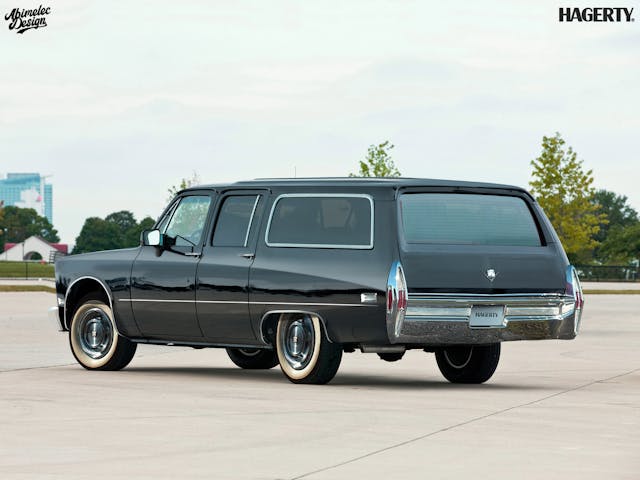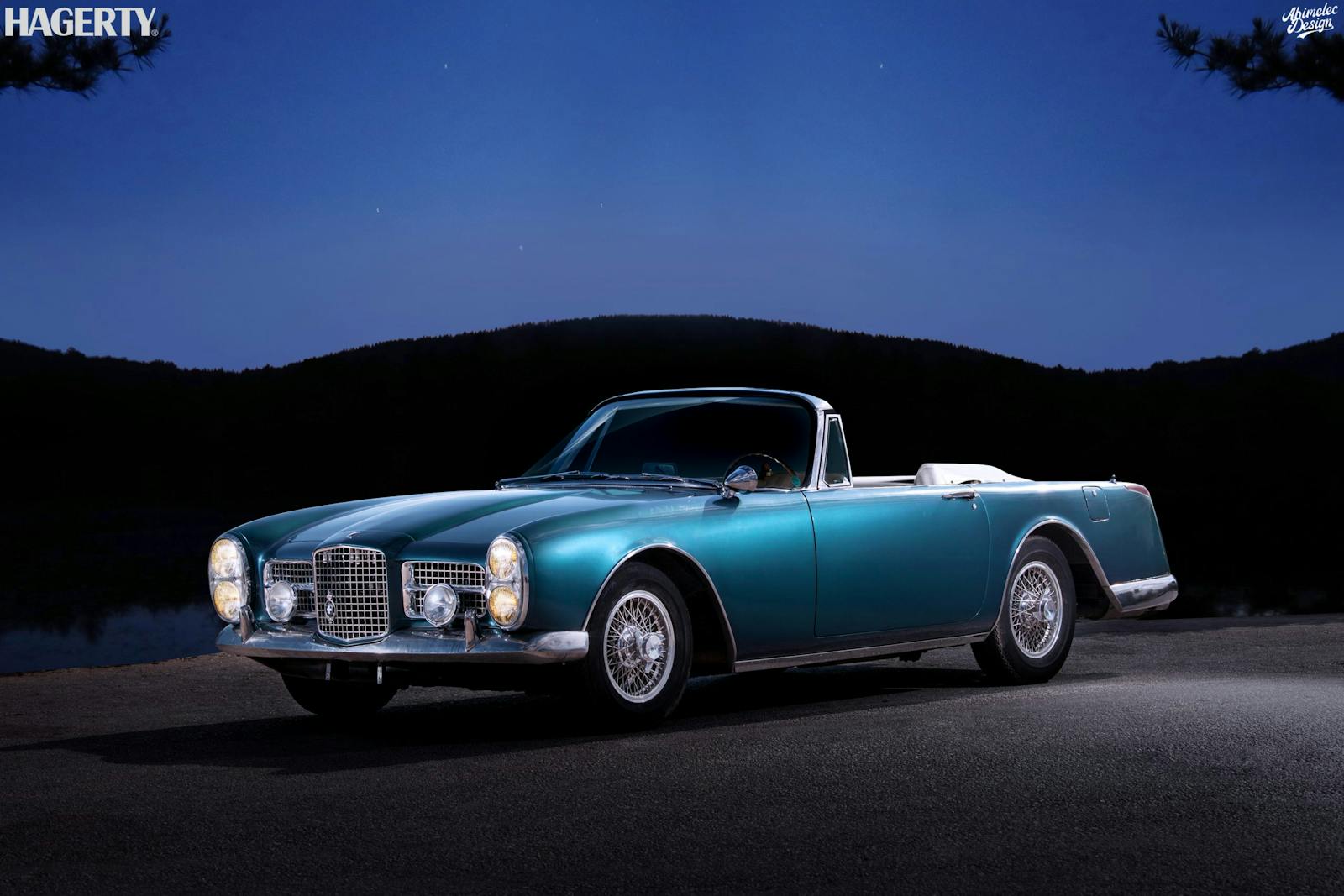What If? Quick Take: 1969 Cadillac Escalade

Welcome to What If? Quick Take, a new feature from imaginative illustrator Abimelec Arellano and Hagerty. While the cars shown in our regular What If? features are full 3D renderings and can appear in any number of images, the Quick Takes are off-the-cuff expressions of Abimelec’s imagination. Each one is accompanied by a short story. Enjoy! — Jack Baruth
“Hey, baby killer!” The woman screaming in Keith’s approximate direction was tall, gorgeous, dressed in tie-dye and denim with a necklace of rough-hewn beads around her graceful neck. She was holding some kind of homemade sign. Keith reflexively scanned the space around him, but there was nobody who looked like a baby killer in his vicinity. Just the usual run of dark-suited businessmen with suitcases in hands. The flight crew, laughing and joking. And a few Marines, like him, in their dress blues, trudging through the terminal of John F. Kennedy airport towards the taxi lane. When he looked back at the woman, she was clearly staring right at him, her intent plain through the wire-rimmed sunglasses with round lenses that hid her pupils. “Yes, you, baby killer!” And she spat directly in his face.
This was Keith’s first five minutes back on solid ground in the United States of America, in the winter of 1970. He felt a flash-forward mix of anger, confusion, fear, and shame. There was a hand on his shoulder and he spun around with his hands up, ready to kill whoever had touched him. But it was just an old, potbellied man in a worn brown Brooks Brothers sack, holding out a threadbare handkerchief. “Oh, ignore that person,” he said, in a voice clearly meant to reach the ears of the hippie chick in question. Out of reflexive politeness, Keith took the handkerchief and dabbed his cheeks, his coat, his Purple Heart with the two black stars. Then the man leaned into his space and said, in a lower, more private manner, “You’re going to see a lot of that. How long were you overseas?”
“Three tours, sir,” Keith replied. “One as an infantry lieutenant, and two as a forward observer.” The man’s eyes widened.
“Well, that’s something. Don’t take what these kids say to heart. They’re scared. Listen. I was in Korea … I did what I had to do. I came home and I didn’t talk about it. After a while, I was fine. You’ll be fine, too.” And then, in a moment that seemed to surprise them both, he wrapped his arms around Keith and squeezed tight. “Go home. They’ll want to see you there.”
“Well, sir, I’m not so sure about that. But thank you. And you should take this back.” They shook hands and parted ways. Keith was almost past his father, who was standing quietly near the last gate, before he realized it and came to a sharp but nonmilitary halt. “Dad. You’re here. I was going to get a taxi.”
“Not after three years away, you’re not. Let’s get your luggage.” As was always the case, Keith’s father was the sharpest-looking man in the room, with blue eyes set in a rugged face that belied his five-six height. A quarter-inch of monogrammed cuff was visible beneath each tailored Glen plaid cuff. His black Alden captoes shone like mirrors. He wore no jewelry, not even a wedding ring, and sported a plain red tie over a white spread-collar shirt. He had drummed this same precision into his five sons, who were accustomed to lining up for inspection on the rare evenings that the old man arrived home before nine or ten. Keith had found the Marines to be in some ways a respite from this, even as his fellow officer candidates at Quantico had chafed under the constant requirements of staying tidy and shipshape.

They proceeded in silence to the luggage carousel and then out to the parking lot. There was a massive black slab of vehicle in front of them. Keith recognized it as a Cadillac, but it seemed more like … “Dad, is this some kind of truck?” His father responded with his usual measuring look.
“Keith, this is what they call an Escalade. It’s the newest thing. I had an Eldorado and I made a nice trade on this right before Christmas. It has four-wheel drive, like a Jeep. Your mother and I have found it very useful for getting up to the slopes. And you can store your skis inside.”
“Well, it’s something.”
“I’ll say it is. Has all the modern conveniences. Four-seventy-two V-8. Three-speed automatic. Power everything. You hardly know you’re driving it, really. And with the four-wheel-drive switched on, you barely have to think about weather. We go out when everyone else is stuck at home.” Keith took the “we” to mean “I”; his father would often leave the house with no warning, usually after having put away a couple of drinks and offering a few sharp words to Keith’s mother, who would retreat into her icy beauty and flawless clothing as she faced the kitchen window.
After years of riding around on half-tracks and whatnot it did not seem unusual to Keith that he needed to climb up into this Escalade, nor was he put off by the vertical windows and slightly crass dashboard with its vinyl stretched thin over rough steel. His father was seated bolt upright, a far cry from the lounging position he would assume behind the wheel of his old Sedan de Ville or Fleetwood.
“You know, I still can’t bring myself to call this place Kennedy,” Keith’s father said in a companionable tone, steering the Escalade out of the lot with one twirling finger. “It’s still Idlewild to me. Tell me one thing that fellow did to deserve an airport named after him, besides get himself killed. Let me tell you something, Keith. The business community, the community of serious men? They despised him. We despised him. And he got us involved in this Viet Nam. To what purpose, exactly? At Anzio I saw the faces of my enemies clear as day. According to Cronkite, you can’t even see these fellows, these Cong. Says they shoot at you from the trees. Says you don’t shoot back. Instead, you burn their villages and bomb the civilians.” His eye was on Keith, who felt compelled to reply.
“I saw plenty of them, Dad. As close as I see you right now.”
“Is that so. And what exactly did you do over there?”
“Didn’t Mom tell you about it? I wrote every week.” Now his father was really looking at him.
“I didn’t approve of that, Keith. I don’t think your mother needed to know everything about your days over there.” Days over there! Like it was summer camp! “I don’t recall writing any sobbing notes to my parents when I was overseas, thirty years ago. I don’t recall telling my parents, who were surely already worried sick, that I could not sleep at night because of the men and women I had killed. That I was suicidal. That I was …” and here the old man’s lip curled into a sneer, “using drugs.”
Well, that tore it. Clearly Mom had been reading the letters to him. But hadn’t that been what Keith had wanted, in the first place? “Listen, Dad. It wasn’t smooth sailing over there. But I volunteered to go. I left college to go, because they were going to draft Mike. You know that. And I signed up for two extra tours so they wouldn’t draft anyone else from our family. Dad, you know that.” Now the old man’s blue eyes seemed to lose some of their edge.
“Yes, Keith, I know that. It was the right thing to do. Your brothers are … Soft. Weak. They sit around the house and talk about smoking dope. About rock music. John went to the Woodstock. You’re aware of the Woodstock? They talked about it over there? Well, after two weeks he didn’t come back so I went upstate to get him.” Keith had to stifle a chuckle as he imagined his father, in his impeccable suit and his Eldorado, driving up the muddy ruts of Yasgur’s farm. “Well, to make a long story short, we found out that some … woman … had taken all of his money and left with some other fellow. So he was working as a short-order cook in the nearest town. Too ashamed to even send a telegram. You can imagine what I thought, seeing him in that state.”
“Yeah, that sounds … uh, pretty bad.”
“Well, he is home now. But not working. Perhaps I should have left him at that restaurant. Which brings up a very relevant subject, Keith: What do you plan to do, now that you’re back home?”
“Ah, I’m still considered part of the Reserve Corps, so I’m officially off active duty as of now. But I was considering going for one more tour… here in the states. I thought… I might be a recruiter or something like that.” Keith’s father flicked an angry glance his way.
“Let me get this straight. You were overseas for three years, screwing around …”
“Dad, I don’t know if I would call it …”
“Screwing around, is what I would call it,” his father snapped, “while your peers got jobs, and started careers, and began building equity in management roles, and now you propose to … lengthen this disadvantage by being a poster boy for the people who almost got you killed, too many times to count?”
“Listen, Dad. We need good men over there. We have a chance to turn it around. To push the NVA back. To really make a difference. To stop the spread of communism before … before it’s here, you know?”
“I do not know, Keith. What I know is this. You are twenty-five years old and you have never held a real job. So I know that this is a problem. And I am prepared to rectify this problem, immediately. I’ve spoken to Hank Green, who is a vice president in the Western division. Next Monday, you’ll take the train in early and make sure you’re standing at his door when he gets to his office. You’ll be on the road and selling before you know it. Hank understands you’re starting at a disadvantage, and he will treat you accordingly, as if you’d been working with the firm for the past three years instead of playing cowboys-and-Indians in that Godforsaken jungle. And I will tell you one more thing, young man. You …” But at that moment, there was a honk and a flash of motion to Keith’s right.
It was that same girl from the airport, but now she was in a car with three hippie friends, a rusty blue VW beetle. They were honking and swerving. He could see the girl’s lips forming the same phrase, again and again. Then they cut across the Escalade’s bow, clearly intending to make Keith’s father lock up the brakes—but instead, the old man hit the gas. There was a sickening crunch as the Cadillac’s nose crushed the driver’s side of the Volkswagen before swatting it away with little apparent effort. The little blue car went backwards into the Jersey barrier two lanes over. Keith heard a thump then a whoosh that seemed to envelop them for a brief hot second before fading.
The Escalade’s hood was lightly buckled but they were still doing perhaps forty miles an hour as the cars behind them came to screeching stops. “Dad,” Keith finally managed to breathe, “… should we stop? Or do something?” In response, his father brought the big Cadillac to a halt on the shoulder. Switched it off. Fixed him with those cold blue eyes.
“We will go home and contact the proper authorities, Keith. Our authorities. I don’t have time to stand around all afternoon and wait for the New York Police Department to make its leisurely way out to us. Everything that has happened in the past three years, Keith, including today, is over. We won’t speak of it again.” Yet as he tossed and turned in his childhood bedroom that evening, unable to sleep, the phantoms of light and noise reaching ten thousand miles to reappear in his hot brain over and over again, Keith felt certain that he would not be able to keep that pledge of silence. It occurred to him that his DEROS, his return date from Vietnam, was in his past—but this was a new kind of tour ahead of him, with its own fears and horrors, and that there was no expiration date to be found on that tour to come, except for one.

